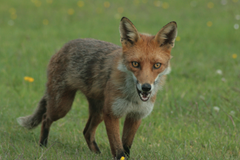Hunting Bill debate
 A private member’s Bill stalls after intense opposition from rural MLAs, but the Green Party plans to continue its campaign.
A private member’s Bill stalls after intense opposition from rural MLAs, but the Green Party plans to continue its campaign.
An attempt to ban hunting with dogs has fallen in the Assembly after a heated debate on the subject. The Hunting Bill was rejected at its second stage but proposer Brian Wilson claims the practice is “on life support” and pledged continued opposition from the Green Party if it enters the next Assembly.
Wilson was elected on a manifesto promise to introduce legislation “outlawing any activities where animals are set against other animals”. Hare coursing was separately banned last June and the Bill’s main focus was to end fox hunting.
Hunting with dogs was banned in Scotland through the Protection of Wild Mammals Act 2002, and in England and Wales under the Hunting Act 2004. It continues in Northern Ireland and the Republic.
A month-long consultation (April-May 2010) attracted several hundred responses, including petitions and letters from the Countryside Alliance. Some commentators opposed the Bill’s introduction while others called for extra offences to be included. Opposition came from the Countryside Alliance while supporters included North Down and Castlereagh councils, and the USPCA. Wilson went ahead with the Bill as drafted.
Two main offences would be created: hunting a wild animal with a dog, and hunting assistance e.g. to allow land or dogs to be used. Hunting, though, would be legally permitted in some cases e.g. stalking or flushing out, hunting rats or rabbits, or recapturing an escaped or released wild animal.
The Bill allowed for imprisonment up to six months, if a person was convicted in a magistrates’ court, or up to two years, if in a crown court. In either case, fines could be imposed to the statutory maximum, currently £5,000.
During the debate on 15 December, MLAs from rural backgrounds argued that hunting was necessary for pest control. The proposer, though, had heard from farmers who opposed hunting and said foxes kept rabbit populations down.
Wilson compared fox hunting to cock-fighting and bear-baiting. “Hunting with hounds has no place in the twenty-first century and seeing animals ripped to shreds by packs of dogs cannot be considered a sport,” he stated, adding that drag hunting, where a scent is chased, provides “all the excitement, colour and tradition of the case without the cruelty of a small animal being torn apart.”
His opening speech was repeatedly interrupted. William Irwin, also a farmer, recalled the mass opposition to the 2004 Act and said this was “one of the few occasions when being set apart from the rest of the United Kingdom is a positive benefit.” Cathal Boylan described hunting as “an inclusive pastime that crosses all boundaries”. To John McCallister, the Bill was the “thin end of the edge” while Dominic Bradley dismissed it as “unenforceable” and an example of direct rule.
However, Conall McDevitt said its opponents were not forming a “coherent argument” against the Bill. Wholehearted support came from Anna Lo, who said farmers were responsible for putting up proper fencing to stop foxes. Stephen Farry concurred: “It is not the fault of dogs but of men and their horses.”
Most members opposed the Bill on an oral vote and it therefore did not proceed. Legislation to ban hunting in Northern Ireland was passed in 1970 and 1982 but not enacted as it ran out of time.
“I don’t think this reflects the true feelings of the people in Northern Ireland,” Wilson told agendaNi after the result, pointing to 70 per cent opposition in England. As for hunting, he added: “It is actually on life support. It’s not going to last. Within some years, it’ll actually disappear like bear-baiting and cock-fighting.”
In agriculture questions on 21 September 2009, Michelle Gildernew said the Executive would need to approve any ban, but hunters could be prosecuted for causing unnecessary suffering to an animal during a hunt. “I will be guided by doing the right thing for animal welfare,” the Minister added.





